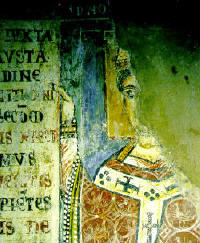|
Rei publicae interest
ne crimina remaneant impunita
Innocent III, Inauditum
(4 February, 1199):
 Quia
vero graviter peccant et qui loquitur mendacium et qui subticet veritatem,
et publice interest, quod maleficia
non remaneant impunita,
magnificentiam tuam rogamus attentius per
apostolica scripta mandantes
(Since
they who speak mendaciously and subvert the truth sin gravely because it
is the public interest that crimes (maleficia)
do not remain unpunished, We call upon your magnificence through Apostolic
letters). . . Quia
vero graviter peccant et qui loquitur mendacium et qui subticet veritatem,
et publice interest, quod maleficia
non remaneant impunita,
magnificentiam tuam rogamus attentius per
apostolica scripta mandantes
(Since
they who speak mendaciously and subvert the truth sin gravely because it
is the public interest that crimes (maleficia)
do not remain unpunished, We call upon your magnificence through Apostolic
letters). . .
Innocent III,
Pope. Die Register Innocenz' III. 1: 1. Pontifikatsjahr, 1198/1199,
Texte. Ed. Othmar Hageneder and Anton Haidacher. Publikationen des
Historischen Instituts beim Österreichischen Kulturinstitut in Rom. Wien:
Verlag der Österreichischen Akademie der Wissenschaften, 1964. No. 546
(549), pp. 790. Po. 591 (Alanus
5.12.5; Collectio Rotomagensis 21)
Lex Aquilia
Dig. 9.2.51(52).4: "Quod si quis
absurde a nobis haec constituti putaverit, cogitet longe absurdius
constitui neutrum lege Aquilia teneri aut alterum potius,
cum neque impunita maleficia esse
oporteat nec facile constitui possit, uter potius lege teneatur, multa
autem iure civili contra rationem disputandi pro utilitate communi recepta
esse innumerabilibus rebus probari
potest (But in case anyone might
think that we have reached an absurd conclusion, let him ponder carefully
how much more absurd it would be to hold that neither should be liable
under the lex Aquilia or that one should be held to blame rather than the
other. Misdeeds (i.e. deeds
that have been performed with culpa)
should not escape unpunished, and it is not easy to decide if one is more
blameworthy than the other. Indeed it can be proved by
inumerable examples that the civil law has accepted things for the general
good that do not accord with pure logic)."
Innocent III, Vt
famae (10 December, 1203)
 Ad
primum igitur respondemus, quod cum prelati excessus corrigere debeant
subditorum
et publice utilitatis interest, ne crimina
remaneant impunita,
et per impunitatis audaciam fiant . . . Ad
primum igitur respondemus, quod cum prelati excessus corrigere debeant
subditorum
et publice utilitatis interest, ne crimina
remaneant impunita,
et per impunitatis audaciam fiant . . .
Innocent III, Pope. Die
Register Innocenz' III. 6: 6. Pontifikatsjahr, 1203/1204, Texte und
Indices. Ed. Othmar Hageneder, John C. Moore, and Andrea Sommerlechner
with Christoph Egger and Herwig Weigl. Publikationen des Historischen
Instituts beim Österreichischen Kulturinstitut in Rom. Wien: Verlag der
Österreichischen Akademie der Wissenschaften, 1995. No. 181 (183), pp.
301-302. Po. 2038.
Alanus Anglicus,
5.12.5 (Inauditum
hactenus speciem falsitatis).
Vercelli, Bibl. Cap. 89, fol.
120r-120v. Gloss of Alanus to "et publice interest quod maleficia non
remaneant impunita" fol. 120v: "Infra de incid. in can. Vt fame <Alan. K
5.23.2= 3 Comp. 5.21.8 (X 5.39.35)>,
ff. ad leg. Aquil. Item uult [Ita
uulneratus recte] § penult. <Dig. 9.2.51(52).4>
ff. [C. recte] de [ade male]penis,
Superioris [Si operis recte], <Cod. 9.47.14> ff. de fideius. Si a
reo § Idem quod uult [uolgo recte] <Dig. 46.1.70(71).5>
Tancred, De
criminibus et qualiter agitur contra criminosos (ca. 1216),
edited by Richard M. Fraher, "Summula de
criminibus: A New Text and a Key to the Ordo iudiciarius,"
Bulletin of Medieval Canon Law 9 (1979) 23-31
Incipit:
Quoniam rei publice interest ut crimina non
remaneant impunita . . .
nota quod quattuor modis agitur de crimine . . . in modum
denunciationis, inquisitionis, exceptionis, et accusationis
(It is in the public interest
that crimes do not remain unpunished ... Note that there are four
ways of bringing a crime to justice: denunciation, inquisition,
exception, and accusation).
Richard M. Fraher, "The
Theoretical Justification for the New Criminal Law of the High Middle
Ages: Rei publicae interest, ne crimina remaneant impunita,"
The University of Illinois Law Review (1984)
577-595 at 590 n. 66: Summa induent
sancti (ca. 1190): "crimina non
remanere impunita publice interest et oportet."
The crucial link between "utilitas" and "crimina impunita" is made in this
text --- but it is unlikely that anyone in the Roman Curia would have
known this Northern French work.
Günter
Jerouschek, "'Ne crimina remaneant impunita': Auf daß Verbrechen
nicht ungestraft bleiben:
 Überlegungen
zur Begründung öffentlicher Strafverfolgung im Mittelalter,"
Zeitschrift der Savingy-Stiftung für Rechtgeschichte, Kan. Abt. 89
(2003) 323-337; also
published in Strafrechtsgeschichte an der Grenze des
nächsten Jahrtausends,
ed. Barna Mezey (Budapest 2003). 54-84, followed by
Markus Hirte, Papst Innozenz III., das
IV. Lateranum und die Strafverfahren gegen Kleriker: Eine
registergestützte Untersuchung zur Entwicklung der Verfahrensarten
zwischen 1198 und 1216 (Rothenburger Gespräche zur
Strafrechtsgeschichte 5; Tübingen: Diskord, 2005) 193-194,
the maxim originates not in an Anglo-Norman
canonist and not in Roman law but in the writings of other twelfth-century
canonists. As I have
said, it is doubtful that the jurists in Innocent's Curia would have known
the Northern French work. Jerouschek does not understand,
however, as Fraher does, that the key link in the formation of this maxim
was to connect "utilitas publica (in its various forms)" and the idea that
"crimina punienda sunt." Unfortunately for his argument he cannot cite a
single text in which "utilitas" or "publice interest" and "crimina
impunita non remaneant" or "crimina punienda sunt" is linked.
Consequently, his argument that the maxim as it evolved in Innocent's
decretals can be or could have been found in the works of the
twelfth-century canonists is off the mark. If the canonists had
already created the maxim, had connected public utility and the idea that
crimes should be punished, Innocent or his jurists would have been able to
pluck it out of one of their works. In fact, however, we can only
follow its evolution to a full-blown maxim only in Inauditum and, finally,
in Vt fame. Further, Jerouschek thinks that Alanus' citation
of "eine dunkle Julian-Kommentierung (p. 327)" in the Lex Aquilia to
justify the birth of the maxim in papal law is not important. He
does not understand the connections that the jurists made constantly when
they adopted concepts from Roman law and incorporated them into the Ius
commune. Alanus saw the connection between the Lex Aquilia and
Innocent's decretal "Inauditum" and pointed it out to his readers.
Later canonists, like Bernardus Parmensis in his Ordinary Gloss to the
Decretals of Gregory IX, had no difficulty in connecting the maxim in Vt
fame with the Lex Aquilia (as well as several other Roman law texts).
Jerouschek denies the link that every jurist of the Ius commune saw.
Most importantly this is still one more example of the powerful influence
and authority of Roman law on canonical jurisprudence at the end of the
twelfth century. Überlegungen
zur Begründung öffentlicher Strafverfolgung im Mittelalter,"
Zeitschrift der Savingy-Stiftung für Rechtgeschichte, Kan. Abt. 89
(2003) 323-337; also
published in Strafrechtsgeschichte an der Grenze des
nächsten Jahrtausends,
ed. Barna Mezey (Budapest 2003). 54-84, followed by
Markus Hirte, Papst Innozenz III., das
IV. Lateranum und die Strafverfahren gegen Kleriker: Eine
registergestützte Untersuchung zur Entwicklung der Verfahrensarten
zwischen 1198 und 1216 (Rothenburger Gespräche zur
Strafrechtsgeschichte 5; Tübingen: Diskord, 2005) 193-194,
the maxim originates not in an Anglo-Norman
canonist and not in Roman law but in the writings of other twelfth-century
canonists. As I have
said, it is doubtful that the jurists in Innocent's Curia would have known
the Northern French work. Jerouschek does not understand,
however, as Fraher does, that the key link in the formation of this maxim
was to connect "utilitas publica (in its various forms)" and the idea that
"crimina punienda sunt." Unfortunately for his argument he cannot cite a
single text in which "utilitas" or "publice interest" and "crimina
impunita non remaneant" or "crimina punienda sunt" is linked.
Consequently, his argument that the maxim as it evolved in Innocent's
decretals can be or could have been found in the works of the
twelfth-century canonists is off the mark. If the canonists had
already created the maxim, had connected public utility and the idea that
crimes should be punished, Innocent or his jurists would have been able to
pluck it out of one of their works. In fact, however, we can only
follow its evolution to a full-blown maxim only in Inauditum and, finally,
in Vt fame. Further, Jerouschek thinks that Alanus' citation
of "eine dunkle Julian-Kommentierung (p. 327)" in the Lex Aquilia to
justify the birth of the maxim in papal law is not important. He
does not understand the connections that the jurists made constantly when
they adopted concepts from Roman law and incorporated them into the Ius
commune. Alanus saw the connection between the Lex Aquilia and
Innocent's decretal "Inauditum" and pointed it out to his readers.
Later canonists, like Bernardus Parmensis in his Ordinary Gloss to the
Decretals of Gregory IX, had no difficulty in connecting the maxim in Vt
fame with the Lex Aquilia (as well as several other Roman law texts).
Jerouschek denies the link that every jurist of the Ius commune saw.
Most importantly this is still one more example of the powerful influence
and authority of Roman law on canonical jurisprudence at the end of the
twelfth century.
There is no doubt,
however, that the idea that crimes should be punished became part of the
common intellectual coin --- if not yet clearly articulated in
twelfth-century thought. Lotte
Kéry demonstrates this quite convincingly by
discovering a text in which "utilitas" and "crimina impunita" are linked
outside of canonical texts, see her essay "Canon Law and Criminal
Law: Results of a New Study," Proceedings of the Twelfth
International Congress of Medieval Canon Law, Washington, D.C. (MIC,
Series C Subsidia 13; Vatican City: 2007)
notes a remarkable text in the
letters of Fulbert of Chartres:
‘sed
cum iuris sit ad utilitatem rei publicae cunctos punire maleficos.’
printed in
The Letters and Poems of Fulbert of Chartres,
ed. and transl. by F. Behrends (Oxford Medieval Texts; Oxford 1976) 54, n.
29. So we have two examples of a link between "publica utilitas" and
"crimina punienda sunt" that pre-date Innocent's decretals. Of
course, we may find more. In the end, however, the maxim is the
product of a skillful blend of Roman law and the common presumptions of
the age. |